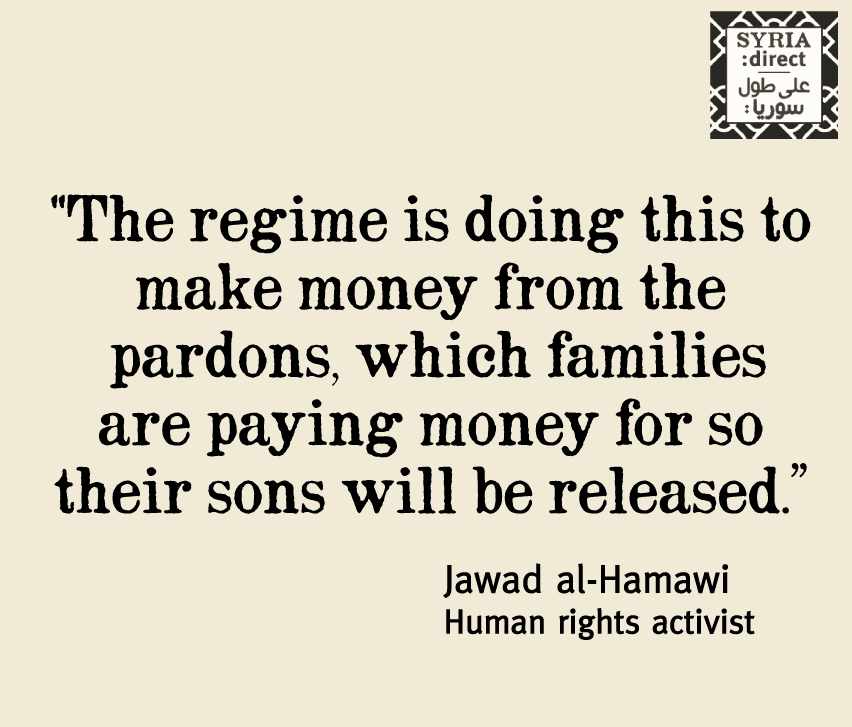Families buy freedom for victims of arbitrary arrest
Last week, the governor of Hama province Ghassan Khalf delivered […]
13 December 2015
Last week, the governor of Hama province Ghassan Khalf delivered a speech to 15 former political prisoners from the Hama Central Prison, calling on them to “return to the embrace of the country and join in its defense.”
The 15 prisoners were the first group to be freed under the auspices of a presidential decree reported in October authorizing a special council in the Military Intelligence Branch to identify detainees eligible for “reconciliation” with the regime. Those who are chosen for the pardon sign a document admitting their crimes and denouncing the revolution in order to be released.
Jawad al-Hamawi, a human rights activist who documents regime violations in Hama, tells Syria Direct’s Alaa Nasser that the release of political prisoners is neither new nor rare, not because they are ready to reconcile with the state, but because their families paid bribes to secure a pardon.
“The regime is doing this to make money from the pardons, because families are paying money so their sons will be released.”
Q: Have prisoners been released on pardons before?
The release of prisoners is not an unusual occurrence. Every day, they release between two and six detainees, according to a former prisoner. He said they are kept in the cell block designated for political prisoners, while the rest of the prisoners arrested for regular crimes are kept with the general population.
What is notable about this new series of releases is that they aren’t being carried out because of the pardons; in most cases the families of the prisoners paid a sum of money to secure their release. The amounts of money paid range from SP500,000 to SP5 million [$2,200-$22,000], depending on the crimes they were accused of.
Q: Do you have an idea how common this phenomenon is?
To be honest, it is difficult to come up with a precise overall number of those who have been released. What a lot of previous detainees have told me is that prisoners spend between 30-70 days in the Military Security branch on the Homs highway, and then after their relatives pay money, they are transferred to the central prison, where they spend about a week before they see a judge who clears them of charges and authorizes them for release.
Q: Why is the regime choosing to release prisoners now?
The regime is like a snake, and its policies change every day. Everyone working with the regime now is just trying to get what they can.
The regime is doing this to make money from the pardons, because families are paying money so their sons will be released. Afterwards, they arrest them again and take them for reserve service in the army. Based on my follow-ups with a number of other released prisoners, a week or less after their release, they are arrested again and kept at the Military Security Branch until they are sent to the fronts.
The regime has been carrying out a campaign of random and arbitrary arrests in Hama as a way to teach the people a lesson, according to what we’ve heard from regime soldiers carrying out the arrests. This campaign started right after the Victory Army began its military campaign in Hama and rumors spread about sleeper cells in the city.
There is nothing to the charges against most of the political prisoners. They are fabricated after the regime tortures them in the Military Security branch and forces them to confess. They accuse them of things such as contacting foreign agents or forming armed cells.







